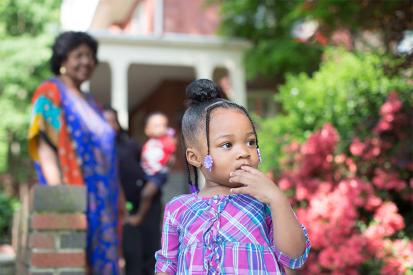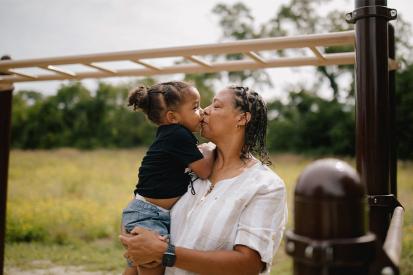What You Need to Know About the Supreme Court’s Foster Care Case


Sharonell Fulton has dedicated over 25 years of her life to caring for more than 40 foster children. To do this, she chose to work with Catholic Social Services, which shares her faith and her passion to help children in need.
But her life’s work caring for these children was being threatened by the City of Philadelphia, which stopped Catholic Social Services from serving children in need through its foster care program in 2018.
Sharonell and Catholic Social Services knew this wasn’t right, so they filed a lawsuit against the City.
Thankfully, the U.S. Supreme Court heard this important case and unanimously ruled in their favor.
Here’s what you need to know.

Who are Sharonell Fulton and Catholic Social Services?
As a Christian, Sharonell sees it as an extension of her faith to care for “the least of these” (Matthew 25:40). That’s why she has partnered with Catholic Social Services in Philadelphia for so many years.
Beyond the fact that Catholic Social Services shares her faith, it also does an excellent job serving vulnerable children.
In 2017, Catholic Social Services oversaw around 100 foster homes every day. That year, it also placed 226 children in foster homes.
It’s no secret the City of Philadelphia could use the help. Philadelphia has more than 5,000 children in foster care on any given day. In 2018, the City issued an urgent call for 300 more foster families. You would think the City would welcome all the help it could get to find loving homes for these vulnerable children, especially from a ministry with such notable success.
But just days later, the City of Philadelphia cut ties with Catholic Social Services.
So what’s going on here?
Fulton v. City of Philadelphia
It likely doesn’t come as a surprise to you that Catholic Social Services operates consistently with the teachings of the Catholic Church—which means it cannot place foster children with same-sex couples because it believes that marriage is the union of one man and one woman. Instead, Catholic Social Services would respectfully refer same-sex couples to another provider, although none have ever sought its help.
However, the City of Philadelphia decided that providers who share that religious belief have no business serving children.
Rather than allowing qualified foster care providers to serve children freely according to their beliefs, the City froze all foster care referrals to Catholic Social Services, preventing the provider’s foster parents from caring for any new foster children.
It didn’t matter that no one had ever made a single complaint about how Catholic Social Services was operating its ministry. The City was determined to punish Catholic Social Services solely because of its beliefs.
That’s unconstitutional. And it’s certainly not doing what is best for the vulnerable children in foster care.
That’s why, with the help of the Becket Fund for Religious Liberty, Catholic Social Services and Sharonell Fulton decided to take a stand against the City’s anti-religious discrimination.
Case timeline
- May 2018: Our friends and allies at Becket filed a lawsuit on behalf of Catholic Social Services and Sharonell Fulton.
- July 2018: Unfortunately, the district court and U.S. Court of Appeals for the 3rd Circuit denied Fulton’s motion for a preliminary injunction. In August, the U.S. Supreme Court likewise denied emergency injunctive relief. Becket appealed the district court’s ruling to the 3rd Circuit to be evaluated on the merits.
- April 2019: The 3rd Circuit ruled against Catholic Social Services and Sharonell Fulton, upholding the City’s new policy of requiring foster care providers to place children with same-sex couples. Becket then appealed to the Supreme Court.
- February 2020: The Supreme Court agreed to hear this case.
- June 2020: Alliance Defending Freedom filed an amicus brief on behalf of two faith-based adoption and foster-care providers that are being forced to make the same impossible choice as Catholic Social Services: conform their beliefs to match the government’s or shut down. ADF has represented other ministries—including New Hope Family Services in New York and Catholic Charities West Michigan—in court to protect their right to operate consistently with their beliefs.
- November 2020: The Fulton case was argued before the U.S. Supreme Court.
- June 2021: The Supreme Court ruled unanimously in favor of Catholic Social Services and Sharonell Fulton.
Outcome
The Supreme Court ruled unanimously that the City can’t discriminate against a faith-based foster-care agency, concluding “The refusal of Philadelphia to contract with [Catholic Social Services (CSS)] for the provision of foster care services unless CSS agrees to certify same-sex couples as foster parents violates the Free Exercise Clause of the First Amendment.”
Every American has the freedom to live according to their religious beliefs. Adoption and foster care providers are no different.
This kind of religious discrimination doesn’t just violate the First Amendment; it also takes a dangerous toll on some of the most vulnerable among us—children in need of loving homes.
Now more than ever, we need highly successful adoption and foster care providers to keep their doors open—providers like Catholic Social Services.
That is what will truly keep kids first.
The bottom line
Every child in need of a loving home deserves the chance to be adopted or cared for by a foster family. Shutting down faith-based adoption and foster care providers means fewer children will have a chance at finding that loving home. And we can’t allow that to happen.
